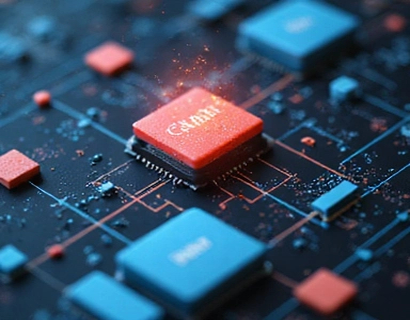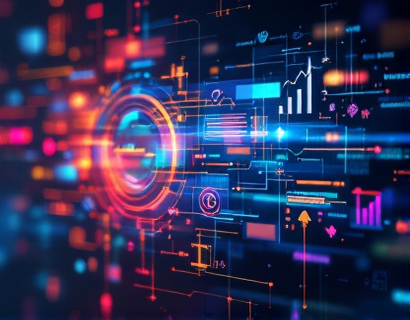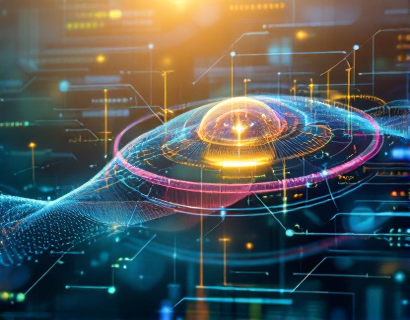Pioneering Next-Gen Digital Transformation with Advanced Tech Solutions
The intersection of cryptocurrency and artificial intelligence (AI) is giving birth to a new era of digital transformation, one that promises to redefine how we interact with technology and each other. This fusion of blockchain technology and advanced algorithms is not just a trend but a fundamental shift in the way we approach digital solutions. For tech enthusiasts and early adopters, understanding this synergy is crucial as it opens doors to innovative applications and services that were once the realm of science fiction.
The integration of AI into the cryptocurrency space has led to the development of smarter, more efficient, and secure financial systems. AI algorithms can analyze vast amounts of data to predict market trends, optimize trading strategies, and enhance security measures. This synergy is not only revolutionizing finance but also extending its impact across various industries, from healthcare to supply chain management.
Enhancing Security with AI
One of the most significant benefits of combining AI with cryptocurrency is the enhancement of security protocols. Traditional cybersecurity methods often struggle to keep pace with evolving threats, but AI brings a dynamic and adaptive approach to security. Machine learning models can detect anomalies in real-time, identifying potential threats before they materialize. This proactive stance is vital in a space where the stakes are high and the consequences of a breach can be catastrophic.
For instance, AI-driven systems can monitor blockchain transactions continuously, flagging suspicious activities with high accuracy. These systems learn from past patterns and continuously improve, making them a powerful tool against fraud and cyberattacks. The result is a more secure environment for users, fostering greater trust in cryptocurrency transactions.
Optimizing Blockchain Performance
Blockchain technology, while revolutionary, faces challenges related to scalability and transaction speed. AI can play a pivotal role in optimizing blockchain performance by streamlining processes and reducing computational overhead. AI algorithms can manage network resources more efficiently, ensuring that transactions are processed swiftly and with minimal energy consumption.
Smart contracts, a cornerstone of blockchain applications, can be enhanced with AI to execute more complex operations automatically. AI can analyze conditions and execute contract terms with precision, reducing the need for intermediaries and lowering transaction costs. This not only speeds up processes but also makes blockchain more accessible and practical for everyday use.
Personalized User Experiences
The combination of AI and cryptocurrency is also transforming how services are delivered to users. AI-driven analytics can provide deep insights into user behavior, preferences, and needs, enabling the creation of highly personalized experiences. In the context of cryptocurrency, this means tailored financial services and products that cater to individual user profiles.
For example, AI can analyze a user's transaction history and financial goals to recommend investment strategies or suggest optimal times for trading. This level of personalization not only enhances user satisfaction but also increases engagement with cryptocurrency platforms. Users are more likely to trust and utilize services that understand and cater to their specific needs.
Innovative Financial Products
The synergy between AI and cryptocurrency is giving rise to innovative financial products that were previously unimaginable. AI can help design and manage decentralized finance (DeFi) applications, which offer a range of financial services on blockchain platforms. These applications, from lending and borrowing to yield farming and insurance, are becoming more sophisticated thanks to AI integration.
AI algorithms can assess risk more accurately, price assets fairly, and automate complex financial operations. This leads to more efficient and accessible financial services, breaking down barriers for users who might otherwise be excluded from traditional banking systems. The result is a more inclusive financial ecosystem where anyone with an internet connection can participate.
Supply Chain Optimization
Beyond finance, the impact of AI and cryptocurrency extends to supply chain management. AI can optimize supply chain operations by predicting demand, managing inventory, and ensuring seamless logistics. When combined with blockchain, these processes become even more transparent and secure. Each step in the supply chain can be recorded on the blockchain, providing an immutable and verifiable trail.
Cryptocurrency can facilitate transactions within the supply chain, reducing reliance on traditional banking systems and lowering transaction costs. AI can monitor and analyze these transactions in real-time, ensuring compliance and efficiency. This integration not only streamlines operations but also builds trust among all parties involved, from manufacturers to consumers.
Healthcare Innovations
In the healthcare sector, the combination of AI and cryptocurrency is paving the way for groundbreaking advancements. AI can analyze medical data to identify patterns and predict outcomes, aiding in diagnosis and treatment planning. Blockchain technology ensures that patient data is secure and privacy is maintained, while cryptocurrency can facilitate seamless and secure transactions for healthcare services and payments.
For instance, AI-driven diagnostic tools can interpret medical images and patient histories to provide accurate diagnoses, while smart contracts can automate insurance claims and payments. This not only improves patient care but also makes healthcare more efficient and cost-effective. The use of cryptocurrency in healthcare also opens up new possibilities for micro-payments and tokenized incentives for healthcare providers.
Challenges and Considerations
While the potential of AI and cryptocurrency is vast, there are challenges that need to be addressed. Regulatory frameworks are still catching up with the rapid pace of innovation, and there is a need for clear guidelines to ensure responsible use. Additionally, the technical complexity of these technologies can be a barrier for adoption, requiring education and support for users and developers alike.
Scalability remains a key issue for blockchain, and AI can help mitigate some of these challenges by optimizing network performance. However, continuous research and development are essential to overcome these hurdles and fully realize the potential of this tech fusion.
Future Outlook
The future of digital transformation through the combination of AI and cryptocurrency is bright and full of possibilities. As technology continues to evolve, we can expect even more innovative applications and services that enhance our digital lives. The integration of AI with blockchain is not just a trend but a fundamental shift in how we approach technology and its role in society.
For those eager to explore this exciting frontier, staying informed and engaged with the latest developments is crucial. The landscape is rapidly changing, and being part of this journey can lead to transformative experiences and opportunities. Whether you are a developer, investor, or simply a curious mind, the intersection of AI and cryptocurrency offers a wealth of possibilities to discover and contribute to.











































